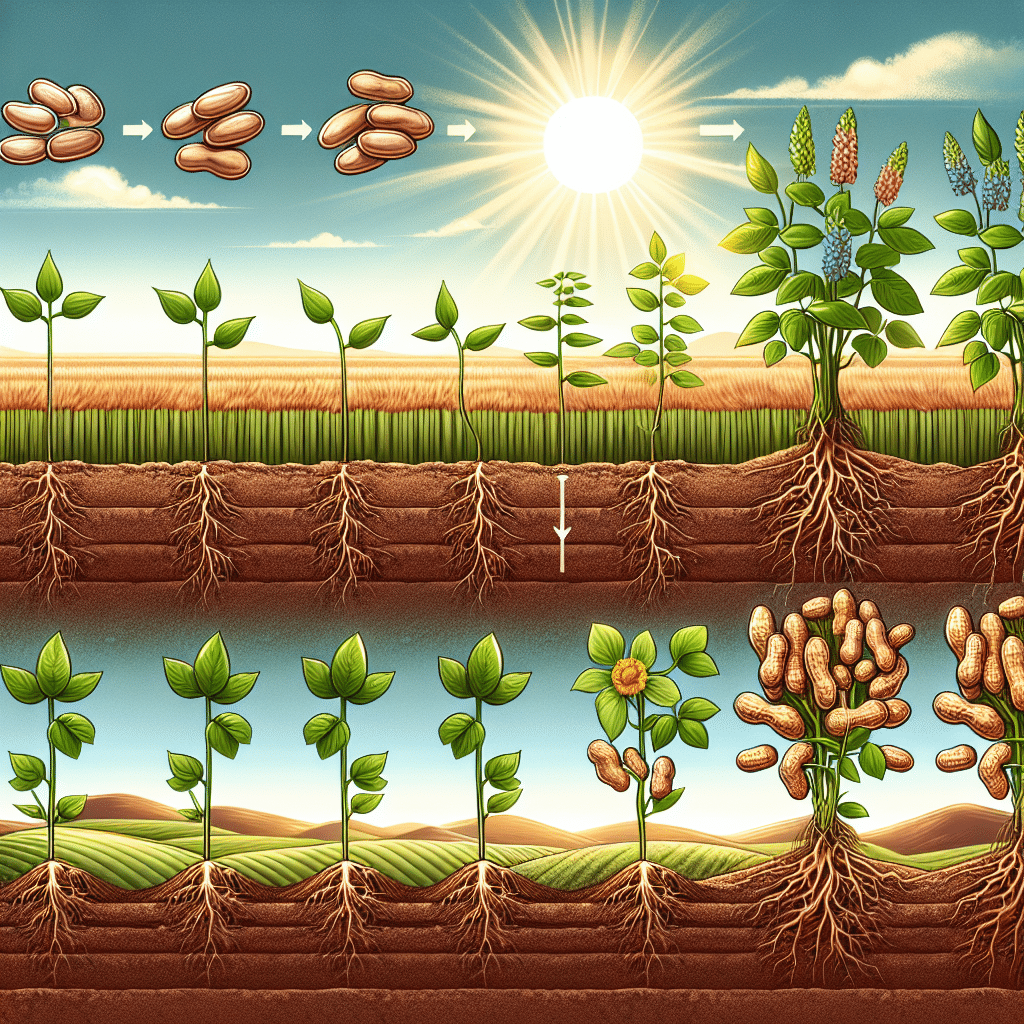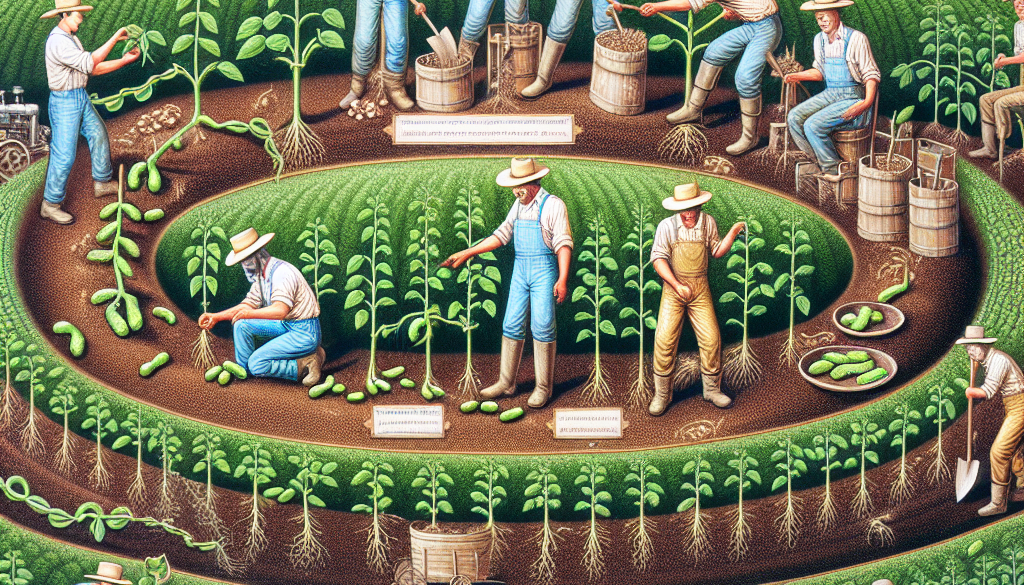Peanuts Grown: Unveiling The Nutty Cultivation
-
Table of Contents
- Peanuts Grown: Unveiling the Nutty Cultivation Process
- The Lifecycle of the Peanut Plant
- Optimal Conditions for Peanut Cultivation
- Global Impact and Production
- Challenges in Peanut Farming
- Innovations in Peanut Cultivation
- Conclusion: The Future of Peanut Farming
- Discover ETprotein’s High-Quality Protein Products
Peanuts Grown: Unveiling the Nutty Cultivation Process

Peanuts, also known as groundnuts, are a staple in diets around the world, revered not only for their rich flavor but also for their impressive nutritional profile. The cultivation of peanuts is a fascinating process that combines agricultural expertise with a touch of botanical intrigue. In this article, we will delve into the world of peanut farming, exploring the lifecycle of the peanut plant, the conditions required for optimal growth, and the global impact of this unassuming legume.
The Lifecycle of the Peanut Plant
The peanut plant (Arachis hypogaea) is unique in its growth process. Unlike tree nuts, peanuts develop underground, which is why they are classified as legumes, akin to beans and lentils. Here’s a glimpse into the stages of peanut growth:
- Planting: Peanut seeds are planted in sandy loam soil after the last frost of the season, typically in April or May, depending on the region.
- Germination: Within days, the seeds germinate, and the plants begin to grow, requiring warm weather and regular rainfall or irrigation.
- Flowering: By mid-summer, the plants produce yellow flowers, which, after pollination, begin the fascinating process of “pegging.”
- Pegging: The fertilized flower stalk elongates and grows downward, burying the ovary of the flower into the soil where the peanut pod develops.
- Maturation: The pods mature underground over the course of several months, with each pod containing multiple peanuts.
- Harvesting: In early autumn, farmers harvest the peanuts by pulling up the entire plant, exposing the pods attached to the roots.
Optimal Conditions for Peanut Cultivation
Peanuts require specific conditions to thrive:
- Climate: A warm climate with a long frost-free period is essential. Peanuts typically need about 120 to 160 frost-free days.
- Soil: Well-drained, sandy loam soil with a pH between 5.9 and 7 is ideal for peanut plants.
- Water: While peanuts are somewhat drought-tolerant, they need consistent moisture, especially during the pegging and pod development stages.
- Sunlight: Full sun is necessary for the peanut plant to produce energy for growth and development.
Global Impact and Production
Peanuts are more than just a snack; they play a significant role in global agriculture. The top producers of peanuts include China, India, and the United States, with the crop being a major economic driver in these regions. Peanuts are used in a variety of products, from peanut butter to cooking oil, and even as a source of protein in animal feed.
Statistics show that global peanut production exceeds 45 million metric tons annually, with consumption continuing to rise due to the nut’s versatility and health benefits. Rich in protein, healthy fats, vitamins, and minerals, peanuts are a valuable crop both nutritionally and economically.
Challenges in Peanut Farming
Despite its importance, peanut cultivation faces several challenges:
- Pests and Diseases: Pests such as the peanut worm and diseases like leaf spot and aflatoxin can significantly impact yield and quality.
- Climate Sensitivity: Peanuts are sensitive to climate conditions, and extreme weather can harm the crop.
- Market Fluctuations: Global market prices for peanuts can fluctuate widely, affecting farmers’ livelihoods.
Advancements in agricultural practices, such as crop rotation and improved pest management, are helping to mitigate these challenges and ensure sustainable peanut production.
Innovations in Peanut Cultivation
Innovation is key to the future of peanut farming. Researchers are developing new peanut varieties that are more resistant to diseases and pests, require less water, and can thrive in a wider range of climates. Precision agriculture techniques, including the use of drones and smart irrigation systems, are also being employed to optimize peanut farming practices.
Conclusion: The Future of Peanut Farming
The cultivation of peanuts is a complex process that requires careful attention to detail and a deep understanding of the plant’s unique lifecycle. As global demand for peanuts grows, so does the need for sustainable and innovative farming practices. With continued research and development, the future of peanut farming looks promising, ensuring that this nutritious and versatile crop remains a staple in diets worldwide.
Discover ETprotein’s High-Quality Protein Products
If you’re interested in incorporating high-quality protein into your diet or products, consider ETprotein’s range of plant-based protein offerings. Their peanut protein, along with other plant proteins like rice, pea, and pumpkin seed, are produced with the highest standards of quality and sustainability in mind. Whether you’re a manufacturer, trader, or simply looking to enhance your nutrition, ETprotein has a solution for you.
About ETprotein:
ETprotein, a reputable protein Chinese factory manufacturer and supplier, is renowned for producing, stocking, exporting, and delivering the highest quality organic bulk vegan protein and plant proteins. They include Organic rice protein, clear rice protein, pea protein, clear pea protein, pumpkin seed protein, sunflower seed protein, mung bean protein, peanut protein etc. Their offerings, characterized by a neutral taste, non-GMO, allergen-free attributes, cater to a diverse range of industries. They serve nutraceutical, pharmaceutical, cosmeceutical, veterinary, as well as food and beverage finished product distributors, traders, and manufacturers across Europe, USA, Canada, Australia, Thailand, Japan, Korea, Brazil, and Chile, among others.
ETprotein specialization includes exporting and delivering tailor-made protein powder and finished nutritional supplements. Their extensive product range covers sectors like Food and Beverage, Sports Nutrition, Weight Management, Dietary Supplements, Health and Wellness Products, and Infant Formula, ensuring comprehensive solutions to meet all your protein needs.
As a trusted company by leading global food and beverage brands and Fortune 500 companies, ETprotein reinforces China’s reputation in the global arena. For more information or to sample their products, please contact them and email sales(at)ETprotein.com today.












